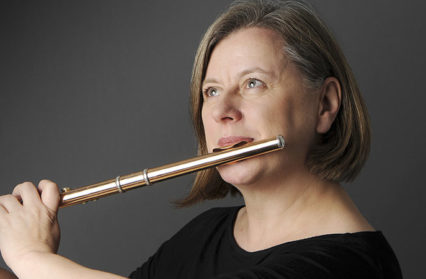Peter Gaskell attends an exhibition at the Chapter Arts Centre in Cardiff by Irish/Welsh Flautist Emma Coulthard called Revoicing the Flute: An Irish Perspective, which explores the work by Irish composers.

The publicity to promote ‘Revoicing the flute – an Irish Perspective’ hit the right buttons to entice one who enjoys music, whether traditional or experimental with plenty of reference to literary influences. Mostly duetting with pianist David Appleton, flautist Emma Coulthard was also accompanied by an array of digitally produced sounds generated from a laptop or via a harness of wires connected to a contraption on the floor that responded to her body movements across the stage.
The aural ambience was set for the first piece, Planxty, once Coulthard’s collaborator Jenn Kirby booted up the software on her laptop to play the soundtrack she had created, a series of effects created from the otherwise inaudible sounds of Coulthard’s fingers tapping the flute keys, magnified and transformed to resemble shells falling or rolling across the theatre space. This was followed by the first duet with David Appleton, Opus Lepidoptera by Fergus Johnston in three parts, the second of which Coulthard referred to as influenced by haiku, a terse angular statement followed by a looser jazz-inspired third movement. If I expected the compositions to be in the Irish tradition made popular by James Galway, familiar as I was with his collaboration with pianist Phil Coulter, Winter’s Crossing, I was wrong-footed, the mood of these pieces being neither jaunty ease nor sweet melancholia. The duo moved into the further taut interplay between piano and flute with the premier of Isola, depicting the tragedy of the death of Oscar Wilde’s younger sister. Having come from Ireland, the composer of the piece, John McLachlan, was in the audience and took a deserved round of applause when he appeared on stage with the musicians afterwards.
Time then for contrast and an opportunity to ease nerves. The start had been delayed due to a fault with Emma Coulthard’s flute whereby she had to make an impromptu trip on low fuel to Pentyrch to get it fixed. Dispensing with the schedule where it was programmed to the finale, Coulthard fitted a glissando headjoint on her flute before improvising sliding runs against a droning background, ambient electronic music created by Irish composer Anna Murray, based in Tokyo. GlssRndr was a mournful plaintive and haunting piece that could have been a Shakuhachi-led meditation, more evidence here of the Japanese influence on Coulthard’s work.
The second part of the performance kicked off with a tour-de-force of flute and piano. Boireann by John Buckley was as craggy as the landscape in County Clare it was depicting. Angular piano staccato phrases punctuated flute cadenzas suggesting the colourful alpine flowers suddenly appearing from crevices in the Burren’s bare rock, distant birdsong audible across its barren terrain. Emma Coulthard had her score printed on several pages spread across four music stands. I surmised some collaboration between composer and musicians as Coulthard was given time to manage the movement of such a volume of sheet music while David Appleton performed solo for the duration. Percussive in his piano playing, Appleton too contributed to the experimental improvisational nature of the music, producing novel effects with the use of blue tack as he manipulated the piano strings under the lid of his instrument.
The final piece was an extraordinary improvisation whereby Emma Coulthard strapped a harness of wires to her arms and legs then moved her limbs to create various effects for the lines she played on her flute, repetition and delay that echoed in the ether above and around. It was captivating all the more because this was the first occasion she had performed with Jenn Kirby’s contraption, adding some theatricality and musical humour to the event.
If my expectations were at all disappointed it was regarding the publicised literary references. Ted Hughes didn’t get a mention, and I would like to have heard more about the influence of Japanese haiku on Opus Lepidoptera, particularly as the poet Basho wrote several haiku about butterflies. Credit though to the composers for their boldness of concept, execution by the performers and to Chapter for hosting such a production to enable audiences to get the chance to see and hear what developments are happening outside mainstream Irish musical traditions.
To keep updated on Emma Coulthard‘s activities, consider following her Twitter, @1girlwithflute.
Peter Gaskell contributes often to Wales Arts Review.










